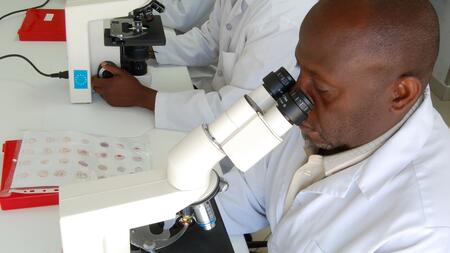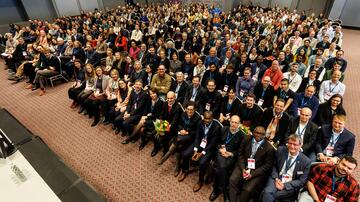Tuberculosis: Research with partners in Africa
The German Center for Infection Research (DZIF) has been playing a significant role in one of five new African-German research networks. Under the name “TB-Sequel”, the BMBF has been funding research on tuberculosis and its public health impacts. Tuberculosis is amongst the diseases which place a particularly high burden on people living in Africa. All in all, the networks will receive around 50 million Euros until 2020.
Up to 50 percent of tuberculosis patients treated with antibiotics develop chronic lung damage. This leads to severe physical impairments, which are often accompanied by high (socio-economic) costs. As yet, globally, there has hardly been any data available from prospective long-term trials investigating the causes of chronic sequelae in tuberculosis patients.
Prof Michael Hoelscher is convinced, “The network and its accompanying additional resources, enable us to conduct on-site investigations of secondary diseases, risk factors and long-term complications of tuberculosis, and to develop new therapeutic approaches.” He is the German contact person for “TB-Sequel”, and coordinates an international study centre for tuberculosis and AIDS for the DZIF at the LMU Munich. Patient’s samples are analysed together with DZIF professors Stefan Niemann and Ulrich Schaible from the Research Center Borstel. Only an early identification of individual risk factors makes a complete recovery possible, which consequently strengthens public health systems in the long term. Tanzania, Mozambique, Gambia and South Africa are members of the “TB-Sequel” network.
A total of 70 proposals for Afro-German networks were submitted to the Federal Ministry of Research and Education, of which five have been approved. Their central task is to fight diseases that pose a particularly high threat to people living in Africa. Besides tuberculosis, these include HIV/AIDS and the so-called “neglected tropical diseases”, such as bilharzia and febrile illness of unknown origin. The five newly funded networks are coordinated by African researchers on the ground. Besides “TB-Sequel”, DZIF members also have partnerships with other networks. An example is “TAKeOFF”, in which DZIF scientists from the University of Bonn, amongst others, have taken up the fight against filariasis, an infection with roundworms.




